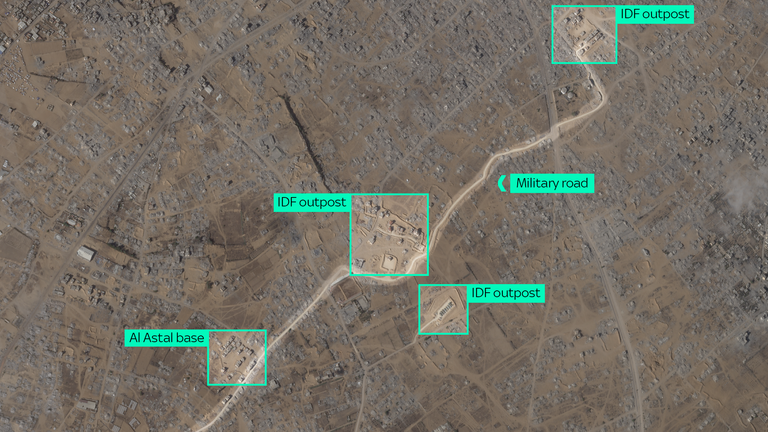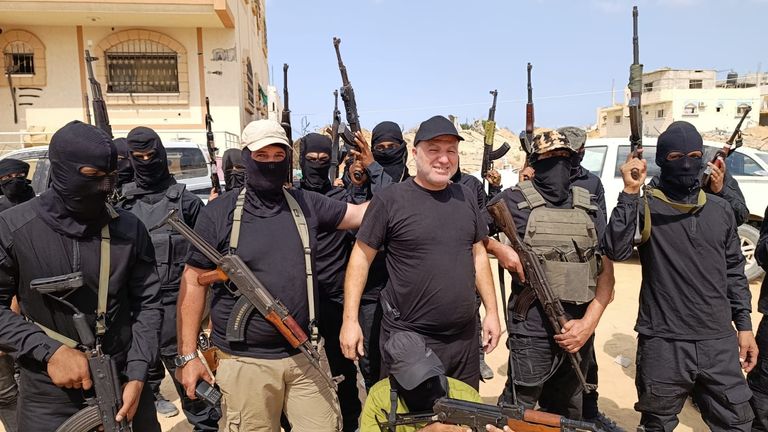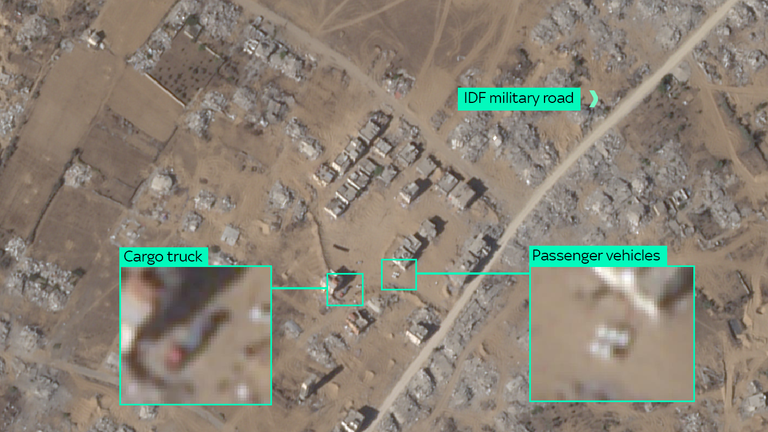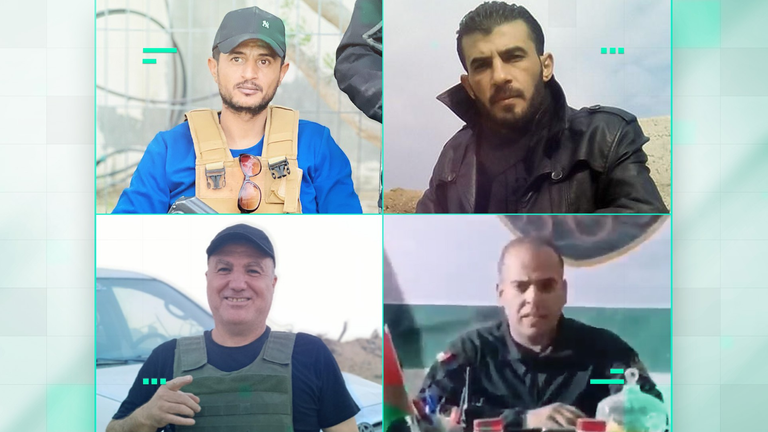Israel may have agreed to stop fighting in Gaza, but it is backing armed groups that plan to fight Hamas to the end.
Sky News has confirmed for the first time that four anti-Hamas militias are all backed by Israel and are considered part of a joint project to remove Hamas from power.
All groups operate from areas still under Israeli control, behind what has been called the “yellow line”, the limit for the deployment of Israel Defense Forces (IDF) troops established by the ceasefire agreement.
“We have an official project: me, [Yasser] Abu Shabab, [Rami] Halas, and [Ashraf] al Mansi,” says militia leader Hossam al Astal, speaking to Sky News from his base in southern Gaza.
“We are all for ‘The New Gaza’. Soon we will achieve full control of the Gaza Strip and we will be reunited under one umbrella.”
The images below, shared with Sky News, show troops from Hossam al Astal’s militia parading near their base.
We used the video to identify the location of the militia headquarters for the first time.
It is located on a military road that runs along the yellow line, less than 700 meters from the nearest IDF outpost.
“Now I hear the sound of tanks as I talk, maybe they’re patrolling or something, but I’m not worried,” he tells Astal.
“They don’t involve us and we don’t involve them. […] “We have agreed, through the coordinator, that this is a green zone, which should not be the target of bombings or shooting.”
The new Gaza
This area, now a patchwork of rubble and military berms, was once a leafy suburb of Gaza’s second city, Khan Younis.
Al Astal says he grew up here, but was forced to flee in 2010 after being persecuted by Hamas for his involvement in militant groups aligned with its rival, the West Bank-based Palestinian Authority (PA).
He spent the next 11 years abroad, working for the Palestinian Authority security services in Egypt and Malaysia.
Two months after his return to Gaza, he was accused of participating in the murder of a Hamas member in Malaysia in 2018 and sentenced to death.
“When the war started, they left us locked up, waiting for the Israelis to bomb the prison and get rid of us,” he says. “Two months later, we broke down the doors and escaped.”
He says his weapons, mainly Kalashnikov rifles, are bought from former Hamas fighters on the black market.
Ammunition and vehicles, on the other hand, are delivered through the Kerem Shalom border crossing, after coordination with the Israeli army.
This is the same border crossing used by another militia leader, Yasser Abu Shabab.
Sky News previously revealed that the Abu Shabab militia was smuggling vehicles into Gaza with the help of the Israeli army and an Arab-Israeli car dealer.
Al Astal says he uses the same car dealership. One of their vehicles appears to have Hebrew writing on the side, which has been partially crossed out.
He says his militia also receives weekly deliveries of everyday items needed to support civilians living in the camp.
“We currently provide basic medical and educational support to approximately 30 families,” he says.
“Children can get apples and bananas, food and drink, chips, etc. However, in the other area, in the tents, you find children of five, 10 or even 15 years old who survive with little more than lentils and pasta.”
He says these supplies arrive through weekly deliveries. In the following video you can see a cargo truck at the militia base.
A similar cargo truck can be seen in satellite images of the camp, taken on October 14.
Sky News has also confirmed that the two other militias operating in northern Gaza are receiving supplies from Israel.
The following video, filmed by a member of Ashraf al Mansi’s militia, shows a car loaded with supplies heading towards their base.
Sky News previously confirmed that this road leads from an IDF outpost or from the Erez border crossing with Israel.
A member of the other militia operating in northern Gaza, led by Rami Halas, told Sky News that coordination with the IDF is done indirectly through the District Coordination Office.
It is part of the Israeli Defense Ministry, but also includes officials from the Palestinian Authority, the internationally recognized Palestinian government based in the West Bank.
This is consistent with what we were told by al Astal, an Israeli soldier stationed in Kerem Shalom, and a senior commander in the Abu Shabab militia: that coordination with the army is managed indirectly and that the Palestinian Authority plays a key role.
“I have people within my group who are still employees of the Palestinian Authority today,” al Astal tells.
The Palestinian Authority did not respond to Sky’s questions, but has previously denied having any relationship with these militias.
“The Palestinian Authority cannot admit to having a direct relationship with us,” says the militia leader.
“They have enough problems already and they don’t want to add to that burden. You know, if it became known that they had ties to the militias or the occupation forces, you can imagine what it would look like.”
Military coordination
Although he acknowledges working with Israel to secure supplies, al Astal denies ever coordinating military operations with the IDF.
News from heaven previously reported that Israeli planes had intervened in two battles fought by the Abu Shabab militia.
We asked Abu Shabab if this was due to coordination, but received no response.
Hamas accused the Al Astal militia group of direct military coordination after several of its fighters were killed when Israel intervened during a battle between the two groups on October 3.
The images below, released by the IDF, show the attacks that day.
“I don’t control Israeli airstrikes,” he tells Astal. “The Israelis simply saw armed Hamas military groups and attacked them.”
In April, two months before founding the militia, Al Astal’s own tent was hit by an Israeli bomb. The attack killed his daughter Nihad, 22, who was seven months pregnant.
“People accuse me of being a collaborator,” he says. “How can someone talk about me like that? Were the Israelis ‘joking’ at me with a missile?”
He believes the attack was aimed at a Hamas member who lived nearby.
“If I listed all the crimes against children and women, the blame would not fall on Israel but on Hamas, which hid among the people.”
Support from external powers
Multiple sources also told Sky News that the militias are also receiving support from outside powers.
The second leader of the Abu Shabab militia, Ghassan al Duhine, has been photographed twice next to a vehicle with UAE license plates.
Sky News also discovered that the logo of the group’s armed wing, the Counter-Terrorism Service, is almost identical to that used by a UAE-backed militia of the same name operating in Yemen.
The logo used by al Astal’s militia, the Counter Terrorism Strike Force, similarly uses the same illustration as that used by another UAE-backed militia, also based in Yemen.
The United Arab Emirates did not respond to Sky’s request for comment.
When we asked Al Astal if he enjoyed the support of the United Arab Emirates, he smiled.
“God willing, in time everything will become clear,” he said. “But yes, there are Arab countries that support our project.”
That project, says al Astal, has a name: The New Gaza.
‘No war…no Hamas, no terrorism’
“Very soon, God willing, you will see with your own eyes: we will become the new administration of Gaza. Our project is ‘The New Gaza’. Without war, in peace with everyone, without Hamas, without terrorism.”
Two days after Sky News spoke to al Astal, Donald Trump’s son-in-law and senior adviser Jared Kushner used the phrase himself when suggesting Gaza could be divided indefinitely along the yellow line.
“There will be no reconstruction funds going to areas that Hamas still controls,” Kushner told reporters on Wednesday.
“There are ongoing considerations in the area that the IDF controls, as long as it can be secured, to begin the construction of a ‘New Gaza’ to give Palestinians living in Gaza a place to go, a place to get employment.”
The IDF declined to comment on these findings. Hamas, the Palestinian Authority and the Coordinator of Government Activities in the Territories, the Israeli agency that manages the border between Israel and Gaza, did not respond to our requests for comment.
He Data and forensics The team is a multi-skilled unit dedicated to delivering transparent journalism from Sky News. We collect, analyze and visualize data to tell data-driven stories. We combine traditional reporting skills with advanced analysis of satellite imagery, social media and other open source information. Through multimedia storytelling we aim to better explain the world and at the same time show how our journalism is done.








